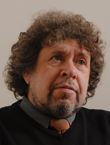Existential Approach to Coaching with Prof. Ernesto Spinelli

In today's world of accelerated change and complexity, choices, responsibility and conflict lead to questions about the quality of life and their impact personally and professionally in achieving goals and aspirations.
This is a one day event being held on 30th January 2015.
Leading existential author and well-known educator, Prof. Ernesto Spinelli will introduce participants to an existential approach to coaching that is based on the premise that uncertainty is something we can rely on, and will use practical exercises to demonstrate its application.
Drawn from contemporary applied psychology and philosophy, an existential perspective bases its approach upon the central assumption that life is uncertain and that paradoxically uncertainty is the one thing that we can rely on at any point throughout our journey.
As human beings we all share the experience of facing and confronting the uncertainties of living and our experience of uncertainty can provide a sense of unease or anxiety.
The existential perspective recognises that anxiety is not necessarily "a bad thing" or a problematic presence that must be reduced or removed. Rather the feeling of anxiety can be stimulating, can put us in touch with our sense of being alive and is the source to all creative and original insight and decision-making.
Prof. Ernesto Spinelli's seminars, lectures and writings have earned him an international reputation as an innovative theoretician and practitioner in contemporary existential psychotherapy and psychology. His interests in existential theory and the demystification of psychotherapy have influenced him in extending psychotherapeutic insight into the field of coaching. As well as maintaining a private practice as a psychotherapist, executive coach and supervisor, Ernesto is the founder of ES Associates. He is a Fellow of both the British Psychological Society (BPS) and the British Association for Counselling and Psychotherapy (BACP), a UKCP registered existential psychotherapist and an APECS accredited executive coach and coaching supervisor. Ernesto is also a faculty member of the i-coach academy.
Having recently published a new edition of his bestselling book, The Interpreted World: an introduction to phenomenological psychology (Sage, 2005), Ernesto is currently completing a practice-focused book on existential psychotherapy and is in the early stages of writing a text entirely devoted to the theory and practice of existential coaching. Ernesto is a Founding Member of the BPS Special Group in Coaching Psychology and is on the editorial board of the International Coaching Psychology Review. His book, Practising Existential Therapy: The Relational World, 2nd edition (Sage, 2014) has been widely praised as a major contribution to the advancement of existential theory and practice. His previous books include: The Interpreted World: an introduction to phenomenological psychology, 2nd ed (Sage, 2005); Demystifying Therapy (PCCS, 2006); Tales of Un-knowing (PCCS, 2006); and The Mirror and The Hammer: challenging therapeutic orthodoxies (Sage, 2001).
Since its foundation in 2001, by Prof. Mike van Oudtshoorn, i-coach academy has sought to achieve standards of excellence in coaching and to maintain its position as the leader in the development of professional coaches. The i-coach academy has three main areas of activity:
Education and Research
Professional Development
Coaching and Consulting Services
At i-coach academy, we offer accredited professional education programmes, which lead to Post Graduate Certificate, Masters or Doctorate qualifications from the Institute for Work Based Learning at Middlesex University. There are also established i-coach academy programmes in South Africa and the United States with additional local accreditation options.
Tags:


